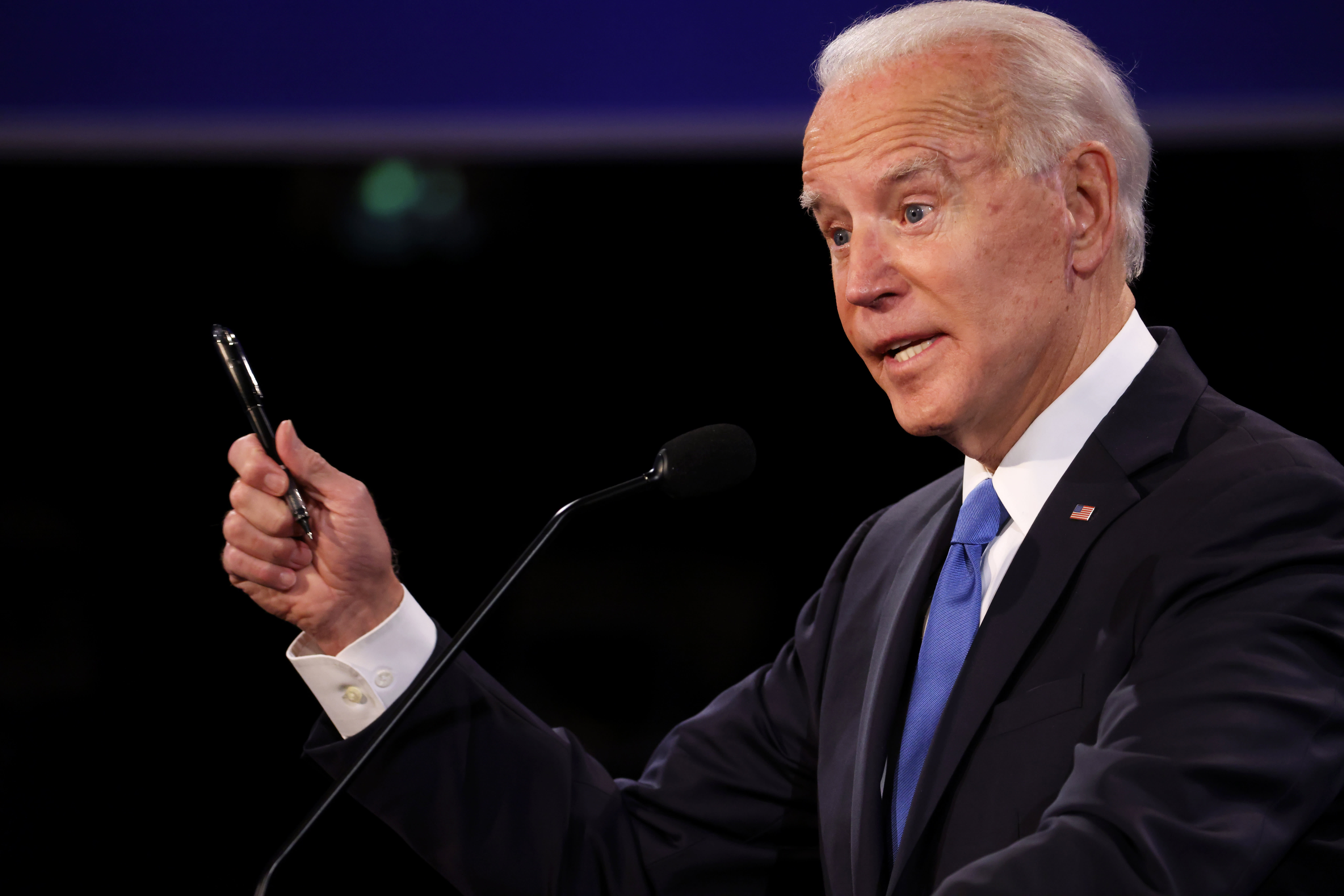Democratic presidential nominee Joe Biden participates in the final presidential debate against U.S. President Donald Trump at Belmont University on October 22, 2020 in Nashville, Tennessee.
Justin Sullivan | Getty Images
Joe Biden declared climate change the “number one issue facing humanity” and vowed a national transition from fossil fuels to renewable energy that could create millions of new jobs.
“It’s the number one issue facing humanity. And it’s the number one issue for me,” Biden said of climate change during an episode of Pod Save America released Saturday. He was interviewed by Dan Pfeiffer, a former senior advisor to President Barack Obama.
“Climate change is the existential threat to humanity,” the former vice president said. “Unchecked, it is going to actually bake this planet. This is not hyperbole. It’s real. And we have a moral obligation.”
Scientists have repeatedly warned that climate-change fueled disasters will continue to get worse and parts of the world will become unlivable as global temperatures rise and governments fail to reduce greenhouse gas emissions by reducing the burning of oil, gas and coal.
Biden, the Democratic presidential nominee, has boasted a $2 trillion plan that invests significantly in clean energy in the transportation, electricity and building industry, cuts fossil fuel emissions and improves infrastructure.
Biden’s plan also puts the U.S. on a path to zero carbon pollution from the electricity sector by 2035 and net-zero emissions by 2050. Coal and natural gas comprise more than 60% of the electricity sector, according to the Energy Information Association.
“It’s going to create millions of jobs … We can’t be cavalier about the impact it’s going to have on how we’re going to transition to do all this,” Biden said of his plan on the podcast. “But I just think it’s a gigantic opportunity, a gigantic opportunity to create really good jobs.”
Scientists say that Biden’s transition plan is required to avoid the most catastrophic consequences of climate change.
“No one is going to build another oil or gas-fired electric plant. They’re going to build one that is fired by renewable energy,” Biden said on the podcast. “We have to invest billions of dollars in making sure that we’re able to transmit over our lines.”
Biden’s plan to transition from oil and natural gas could be politically popular but may potentially hurt him in major oil and gas states as the Nov. 3 election nears.
The issue is particularly important in Pennsylvania, a state that could be decisive on election day and has a strong fracking industry and Trump base in the southwestern part of the state. Biden, however, has said he would only ban fracking on federal lands. Most oil and gas does not come from federal lands.
But oil and gas executives have been aware of the global movement towards renewable energy and say the U.S. will still require fossil fuel production for decades to come even during a global transition.
During the podcast, Biden said he’s gone to the major labor unions in the U.S. to convince them to sign onto his climate change plan, emphasizing that he won’t “discount the concerns” of people who could lose work during a transition to renewables.
In Thursday’s presidential debate, Biden emphasized that the transition away from climate-changing fossil fuels would occur “over time.” After the debate, he said that fossil fuels would not be eliminated until 2050 as part of his plan.
President Trump, who has pulled the U.S. from the Paris climate accord and consistently expressed support for fracking, responded to Biden’s remarks with a traditional appeal to voters in competitive oil and gas states.
More from CNBC Environment:
‘We are out of time:’ Destructive wildfire season grows longer in Colorado, scientists warn
September 2020 was the hottest on record worldwide
Heatwaves are becoming more deadly as nights warm faster than days
“Basically what he is saying is he is going to destroy the oil industry,” Trump said during Thursday’s debate. “Will you remember that, Texas? Will you remember that, Pennsylvania? Oklahoma? Ohio?”
Trump has denied the science of climate change and reversed more than 70 major environmental regulations during his four years in office, with nearly 30 more in progress.
But climate change has been a top issue of the 2020 presidential election, especially among younger voters.
Nearly two-thirds of voters think the federal government is not doing enough to mitigate climate change, according to a Pew Research Center poll this year. Roughly 79% of Americans said the U.S. should make developing alternative sources of energy like wind and solar a priority.
Biden leads on climate change by an enormous margin, with 58% to 19% of registered voters saying the former vice president would address the problem better than President Trump, according to an NBC News/Wall Street Journal poll.
This year, climate-change fueled disasters including record-setting wildfires in the U.S. West and one of the most active Atlantic hurricane seasons ever have plagued the country.
September 2020 was the warmest month on record worldwide and this year is set to be one of the five hottest in recorded history.

